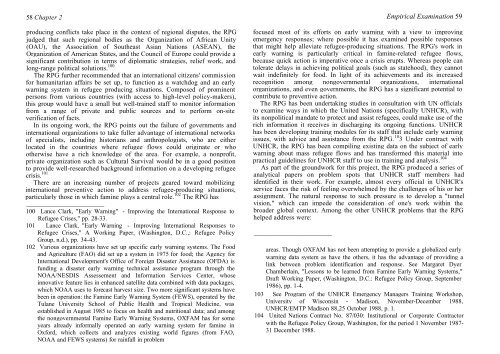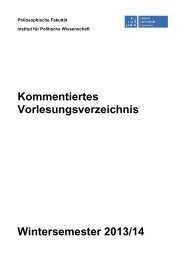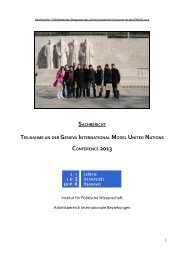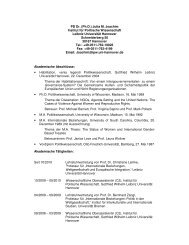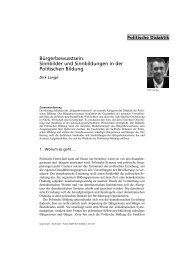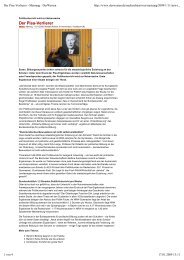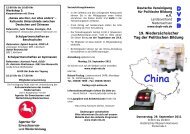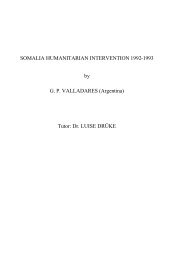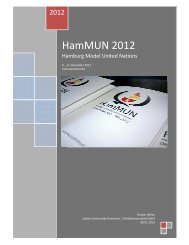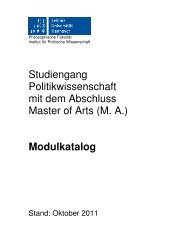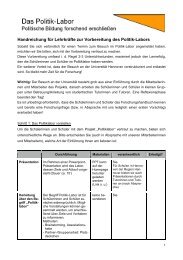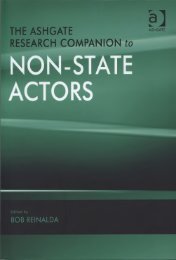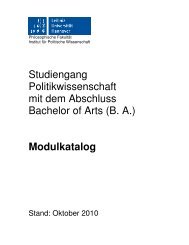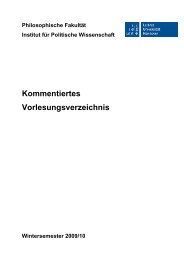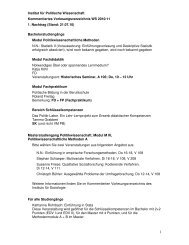Preventive Action for Refugee Producing Situations
Preventive Action for Refugee Producing Situations
Preventive Action for Refugee Producing Situations
You also want an ePaper? Increase the reach of your titles
YUMPU automatically turns print PDFs into web optimized ePapers that Google loves.
58 Chapter 2<br />
producing conflicts take place in the context of regional disputes, the RPG<br />
judged that such regional bodies as the Organization of African Unity<br />
(OAU), the Association of Southeast Asian Nations (ASEAN), the<br />
Organization of American States, and the Council of Europe could provide a<br />
significant contribution in terms of diplomatic strategies, relief work, and<br />
long-range political solutions. 100<br />
The RPG further recommended that an international citizens' commission<br />
<strong>for</strong> humanitarian affairs be set up, to function as a watchdog and an early<br />
warning system in refugee producing situations. Composed of prominent<br />
persons from various countries (with access to high-level policy-makers),<br />
this group would have a small but well-trained staff to monitor in<strong>for</strong>mation<br />
from a range of private and public sources and to per<strong>for</strong>m on-site<br />
verification of facts.<br />
In its ongoing work, the RPG points out the failure of governments and<br />
international organizations to take fuller advantage of international networks<br />
of specialists, including historians and anthropologists, who are either<br />
located in the countries where refugee flows could originate or who<br />
otherwise have a rich knowledge of the area. For example, a nonprofit,<br />
private organization such as Cultural Survival would be in a good position<br />
to provide well-researched background in<strong>for</strong>mation on a developing refugee<br />
crisis. 101<br />
There are an increasing number of projects geared toward mobilizing<br />
international preventive action to address refugee-producing situations,<br />
particularly those in which famine plays a central role. 102 The RPG has<br />
_________________________<br />
100 Lance Clark, "Early Warning" - Improving the International Response to<br />
<strong>Refugee</strong> Crises," pp. 28-33.<br />
101 Lance Clark, "Early Warning - Improving International Responses to<br />
<strong>Refugee</strong> Crises," A Working Paper, (Washington, D.C.,: <strong>Refugee</strong> Policy<br />
Group, n.d.), pp. 34-43.<br />
102 Various organizations have set up specific early warning systems. The Food<br />
and Agriculture (FAO) did set up a system in 1975 <strong>for</strong> food; the Agency <strong>for</strong><br />
International Development's Office of Foreign Disaster Assistance (OFDA) is<br />
funding a disaster early warning technical assistance program through the<br />
NOAA/NESDIS Assessement and In<strong>for</strong>mation Services Center, whose<br />
innovative feature lies in enhanced satellite data combined with data packages,<br />
which NOAA uses to <strong>for</strong>ecast harvest size. Two more significant systems have<br />
been in operation: the Famine Early Warning System (FEWS), operated by the<br />
Tulane University School of Public Health and Tropical Medicine, was<br />
established in August 1985 to focus on health and nutritional data; and among<br />
the nongovernmental Famine Early Warning Systems, OXFAM has <strong>for</strong> some<br />
years already in<strong>for</strong>mally operated an early warning system <strong>for</strong> famine in<br />
Ox<strong>for</strong>d, which collects and analyzes existing world figures (from FAO,<br />
NOAA and FEWS systems) <strong>for</strong> rainfall in problem<br />
Empirical Examination 59<br />
focused most of its ef<strong>for</strong>ts on early warning with a view to improving<br />
emergency responses; where possible it has examined possible responses<br />
that might help alleviate refugee-producing situations. The RPG's work in<br />
early warning is particularly critical in famine-related refugee flows,<br />
because quick action is imperative once a crisis erupts. Whereas people can<br />
tolerate delays in achieving political goals (such as statehood), they cannot<br />
wait indefinitely <strong>for</strong> food. In light of its achievements and its increased<br />
recognition among nongovernmental organizations, international<br />
organizations, and even governments, the RPG has a significant potential to<br />
contribute to preventive action.<br />
The RPG has been undertaking studies in consultation with UN officials<br />
to examine ways in which the United Nations (specifically UNHCR), with<br />
its nonpolitical mandate to protect and assist refugees, could make use of the<br />
rich in<strong>for</strong>mation it receives in discharging its ongoing functions. UNHCR<br />
has been developing training modules <strong>for</strong> its staff that include early warning<br />
issues, with advice and assistance from the RPG. 10 3 Under contract with<br />
UNHCR, the RPG has been compiling existing data on the subject of early<br />
warning about mass refugee flows and has trans<strong>for</strong>med this material into<br />
practical guidelines <strong>for</strong> UNHCR staff to use in training and analysis. 104<br />
As part of the groundwork <strong>for</strong> this project, the RPG produced a series of<br />
analytical papers on problem spots that UNHCR staff members had<br />
identified in their work. For example, almost every official in UNHCR's<br />
service faces the risk of feeling overwhelmed by the challenges of his or her<br />
assignment. The natural response to such pressure is to develop a "tunnel<br />
vision," which can impede the consideration of one's work within the<br />
broader global context. Among the other UNHCR problems that the RPG<br />
helped address were:<br />
_________________________<br />
areas. Though OXFAM has not been attempting to provide a globalized early<br />
warning data system as have the others, it has the advantage of providing a<br />
link between problem identification and response. See Margaret Dyer<br />
Chamberlain, "Lessons to be learned from Famine Early Warning Systems,"<br />
Draft Working Paper, (Washington, D.C.: <strong>Refugee</strong> Policy Group, September<br />
1986), pp. 1-4.<br />
103 See Program of the UNHCR Emergency Managers Training Workshop,<br />
University of Wisconsin - Madison, November-December 1988,<br />
UNHCR/EMTP Madison 88,25 October 1988, p. 1.<br />
104 United Nations Contract No. 87/030: Institutional or Corporate Contractor<br />
with the <strong>Refugee</strong> Policy Group, Washington, <strong>for</strong> the period 1 November 1987-<br />
31 December 1988.


